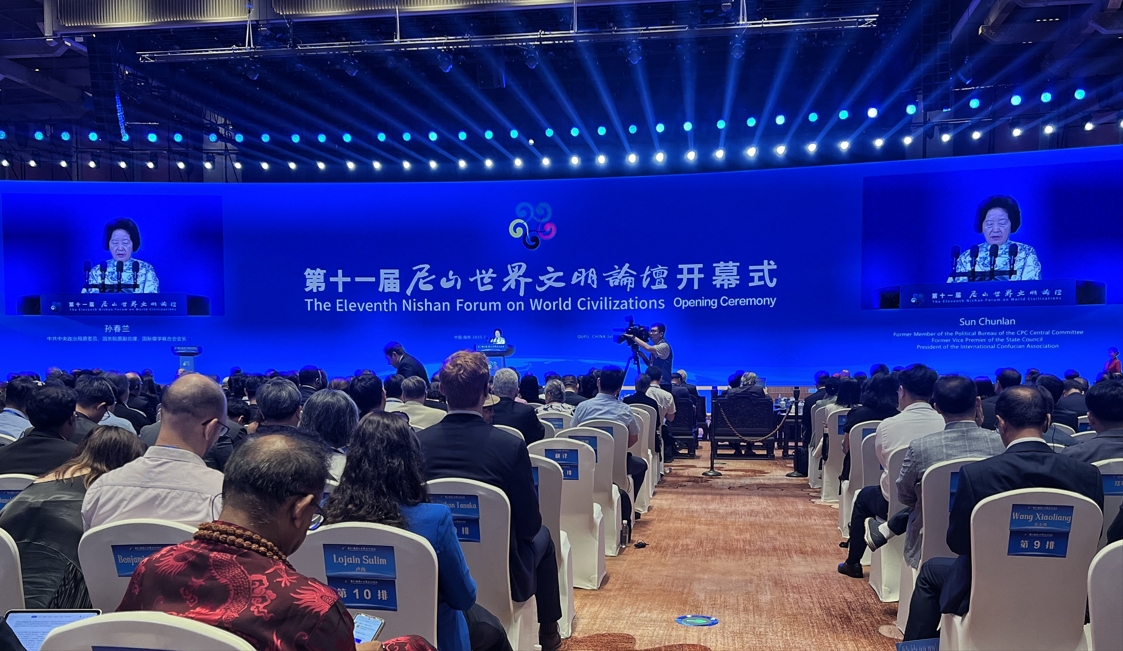The 11th Nishan Forum on World Civilizations opened on July 9 in Shandong, China. Against a backdrop of escalating regional conflicts, resurgent protectionism, and deepening geopolitical fractures, this year’s convening carries profound weight. Coinciding with the 80th anniversary of the victory in the World Anti-Fascist War, the forum’s theme – “Beauty in Diversity: Nurturing Understanding Among Civilizations for Global Modernization” – serves as both a stark counter-narrative to division and a bold blueprint for cooperative human advancement.

The Eleventh Nishan Forum on World Civilizations opens on July 9 in Shandong, China.
Harmony in Diversity
The forum is well-timed. As Sun Chunlan, president of the International Confucian Association, noted in her opening address, we stand at a “historical crossroads” where the value of civilizational cooperation has never been more evident.
The shadows of 20th-century catastrophes remind people that unilateralism and civilizational superiority theories breed only destruction. Dr. Chhem Kieth Rethy, senior minister of the Royal Government of Cambodia, contextualized the gathering within today’s “converging crises” – conflict, climate chaos, economic instability, and digital disruption, emphasizing that true progress demands drawing from humanity’s shared reservoir of wisdom.
At the heart of the forum lies a powerful Confucian-inspired ethos: the celebration of distinctiveness within unity.
Rejecting cultural erasure, Vice President of the Maldives Hussain Mohamed Latheef passionately asserted that modernization should never erase cultural identity, urging the adaptation of a mechanism that safeguards traditions while embracing innovation. This counters homogenizing visions of progress.
The traditional Chinese concept of “harmony in diversity” has been broached as an antidote. Vice President of International Confucian Association and Deputy Director of the Academic Committee of the Nishan Forum on World Civilizations Roger T. Ames, dissected the limitations of Western frameworks pitting relativism against absolutism. He championed Confucian relational equity as a third option: a pluralism fostering “superlative and inclusive harmony out of difference.” This framework respects sovereignty while demanding mutual responsibility within an interdependent world.
Diversity also serves as the engine of modernization. Sun Chunlan articulated an underlying truth: “Civilizational diversity fundamentally determines the diversity of modernization paths.” Each civilization’s unique historical and cultural soil nourishes distinct, valid approaches to development. Attempts to impose a single model are philosophically flawed and practically destructive.
Modernization thrives not through uniformity, but through the cross-pollination of diverse civilizational strengths.
The Global Civilization Initiative: From Vision to Practice
The forum positioned itself as a vital platform for enacting President Xi Jinping’s Global Civilization Initiative (GCI), which champions dialogue and mutual learning as pillars of human progress.
The initiative has moved beyond abstract ideals, fostering concrete exchanges. Scholars like Riccardo Pozzo, from Tor Vergata University of Rome, highlighted tangible areas for China-Europe collaboration – institutional reform, equitable access to culture, participatory governance, and ethical tech development – all grounded in mutual respect.
China-Cambodia- relations were also showcased as a living model. Rethy traced centuries of Buddhist scholarly exchange and emphasized today’s cooperation blending “Confucian scholarship [and] Buddhist ethics” with infrastructure and digital innovation. This exemplifies modernization consciously rooted in shared civilizational memory. The historical Silk Roads were invoked not merely as trade routes, but as “bridges of knowledge” linking Quanzhou with Nalanda, and Chang’an with Constantinople. They stand as enduring proof that contact in commerce, faith, and thought enriches rather than erodes civilizations. Reviving this spirit in modern diplomacy and people-to-people exchanges is crucial.
The forum coalesced around actionable principles for building a genuinely inclusive international order, by rejecting hegemony and championing equity.
Attendees dismantled notions of civilizational hierarchy, and countered unilateralism in global governance, while showing respect to nations’ rights to self-determined paths. This is helping amplify diverse voices in international institutions, reflecting contemporary realities, not outdated power structures. They also proposed to transform education systems to integrate ethical philosophy, comparative history, and cross-cultural understanding as core competencies.
In addition, delegates called for establishing robust frameworks for joint cultural heritage preservation, collaborative academic research, and the development of technologies (especially AI) governed by pluralistic ethical standards.
Tradition as the Bedrock of an Inclusive Future
Multiple speakers, including Kong Deli, director and research fellow of China Confucius Research Institute, traced China’s distinctive capacity for inclusion to its agrarian civilizational roots. He pointed out that the holistic worldview of “unity of heaven and humanity” perceives the cosmos, society, and humanity as being interconnected. It fosters an inherent responsibility towards harmony and rejects exploitative dominance.
Niu Xiping, vice president of the International Confucian Association, highlighted classical Chinese thought, like those in the Book of Change and Doctrine of the Mean, which view the universe as an “organic whole” where “all things flourish without harming each other.” This cosmological perspective naturally translates into a societal ethos valuing integration over exclusion.
Kong Deli emphasized that traditional Chinese governance relied on Li (礼), a system embedding ethics and norms within ritual practice and social roles. This fostered a uniquely integrated social order prioritizing collective flourishing.
The Nishan Forum offers more than dialogue; it presents a paradigm shift. In a world festered by division and simplistic binaries, it champions pluralism as strength and dialogue as a necessity. Rethy’s closing metaphor resonated deeply with delegates: the future should resemble a vibrant garden, where each civilization, like a unique bloom, contributes its distinct “color, fragrance, and form.” The gardener’s wisdom lies not in enforcing uniformity, but in nurturing diversity with care and patience.
As Ames articulated, Confucianism offers the world a crucial alternative: not a dominating universalism nor a fragmenting relativism, but a relational order based on equity. The path forward, as illuminated at Nishan, rejects the false choice between clashing absolutes. It calls instead for a polycentric global modernization, rooted in the memory of past wisdoms, responsive to present challenges, and committed to a future where civilizations flourish together, each beautiful in itself, all beautiful in concert. In this collective endeavor lies humanity’s best hope for navigating the storms of the 21st century.